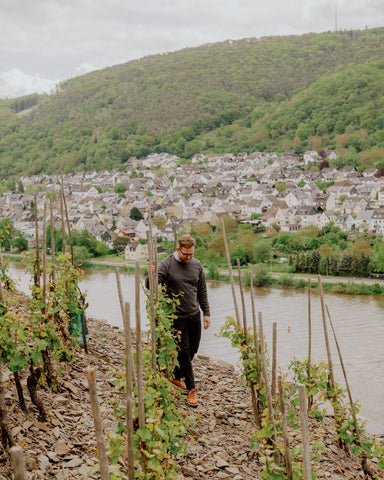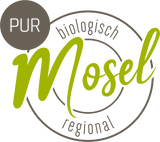
Personal, potential and perspectives - an interview with Sommelier Marian Henß on the subject of "Biowein"
Marian Henß is a far -riot sommelier who was able to get to know the wine world nationally and internationally. With an eye for authenticity and origin as well as the view of sensible use of the Natur resource, he has been inspiring the guests of the Andernach restaurants Yoso, Ai Pero and Purs with exciting wine recommendations and events for four years.
(Photos: Franz Grünewald / Miles & More)
The first question of the sensor arts does bioWein tastes different?
No. Anyone who claims this will probably mix the terms. Because organic wine is not developed differently than conventionally generated plants. In the very first line, the “biowein” is about ecological agriculture.
What role does biowein play in top gastronomy?
A very big one! Regardless of certifications and control organs, many of the best wines in the world come from ecological or even biodynamic viticulture. And also the following applies: Anyone who deals with their products, nature and the surrounding area also starts to think about where small adjustment screws can be positively influenced. And then the topic of "biowein" is essential.

How big is the interest of guests in the wines and their production path?
I think significantly higher in retail than in gastronomy. But of course the "story Telling" at the guest is a big part for the overall experience of our guests. So we like to talk about the wines served at the table. The interest as well as the acceptance and experience of the guests are getting better.
Hand on heart, when did the first ecologically produce wine come on your cards?
Ecologically produced wines have always shaped the wine cards that I was responsible for. Not dogmatic, but simply organically grown through quality fanaticism.
How many positions are your wine lists currently equipped with?
I appreciate over 70 percent of the almost 1,000 wines.
According to what points of view, do you choose your wines in general?
Quality, independence, need/use to our very polarizing kitchen and also adapted accordingly.
Is Biowein a product in need of explanation?
Fortunately, not in gastronomy. We just give in and then talk to the guests about it.
Don't the numerous organic labels confuse?
Indeed, that doesn't make it easier. Although this probably applies even more to consumers.

Do winemakers with ecological production have more difficult to land on the wine lists than conventional winemakers?
I think we are currently at the turning point and this, for the upscale gastronomy, will and will soon run the other way around! And actually quite on the contrary, in most wine regions in the world, organic is not seen as a marketing tool. Rather, it is a step to a better, more stable ecosystem in the vineyards and thus also to a significantly higher quality.
What potential does the Moselle have to offer here?
The Moselle is sure to hang behind in the steeply due to its topography and tedious management. But numerous examples prove that there is another way. The potential is accordingly very large. The Moselle as perhaps the most important region in Germany, in global perception, should meet its pioneering role here. The stylistic diversity around the Riesling is an absolute unique selling point. The world envies us about these alcoholic wines, which stand out through finesse, aromatic depth and durability.
And how is the Moselle in international comparison?
Openly spoken: unfortunately not so good. Large regions such as Bordeaux or Burgundy are slowly coming up here. Activities and efforts are all the more important to set the lever here. Pur Moselle is exactly the right approach here.
Doesn't Biowein from the Moselle sell under value often compared to other wine -growing areas?
Doesn't this also apply to the entire Moselle? Whether conventionally or ecological, measured by the workload in the steep slopes, the price level is generally too cheap if you compare with the Palatinate or Rheinhessen.

Why has French top French operations for decades to achieve maximum prices in the market for their wines from ecological cultivation?
As I already mentioned, it is not about using "organic" striking. Rather, it is a attitude to life and fundamental conviction. As a winemaker, you want to be vitals and the next generation of vitally and with intact floors. Using the example of France, none of the globally successful and traded winery puts the word "organic" in the foreground. They see ecological agriculture as the decisive element in their entire wine -growing process in order to tickle the maximum quality. We have to go there! A quality understanding of the highest quality, class instead of mass. That also has a certain price.
How will the topic of "wine from ecological production" develop in the catering trade in the future?
The tendencies are clear. Conscious nutrition, holistic approaches and sustainable procurement. In the cultivated and educated milieu of the middle and upper class, the consumption of meat and other ecological sins is also greatly reduced in the medium term. In the catering trade, concepts are continued to adapt to this trend. Accordingly, the demand for certified products in the organic segment will continue to increase significantly.
Where do you still see potential?
I see potential in control organs. Anyone who is "organic" and "sustainably", but uses convenience products in the kitchen or pouring national water brands of large corporations, does not consistently deal with themselves and their concept. Our actions have to go through the water in the gastronomy, over all drinks - with that also wine, coffee and tea - in addition to the cleaning agents and of course the food in the kitchen. As the name of food already suggests, these products should also contain vitality and not come from dead fields or vineyards.

In general, the topic of sustainability in food is very present. Only wine is often difficult here, why is that?
I don't think it's so dramatic. But measured by bare numbers, we only use a small fraction of the overall market in the middle to upscale wine segment.
On the national average, a bottle of wine still costs well below 4 euros. The biggest players are our discounters that turn gigantic amounts of wine. And at the price level, healthy, ecological viticulture is almost impossible.
Transport, packaging, bottle, cork and label alone quickly make up 2 euros.
Is there a personal favorite?
Since I deal almost exclusively with at least ecologically produced wines, my favorite constantly varies and depends heavily on the mood. I like to repeat again that I do not do this dogmatic.
What kind of meal can you recommend?
To be honest, I can't imagine that I could not like to taste too sensible and sustainably produced.
Event tip:
"Online Biowein test with sommelier Marian Henß"
Sunday February 6, 2022
6:00 p.m. to 7:00 p.m.
3x2 top wines from our organic winzern:
1. Steffens-Kess Riesling dry "Burger Hahnenritschen"
2. Clemens Busch Riesling dry from the "red slate"
3. Martin Schömann Riesling-Kabinett Feinherb "Zeltinger sundial"
Plus exciting entertainment and exchange via zoom.
The rehearsal package is available for 65 euros plus shipping costs online on our
Homepage:www.pur-mosel.de
PS: From 02/11/2022 the puret in Andernach is open again.
